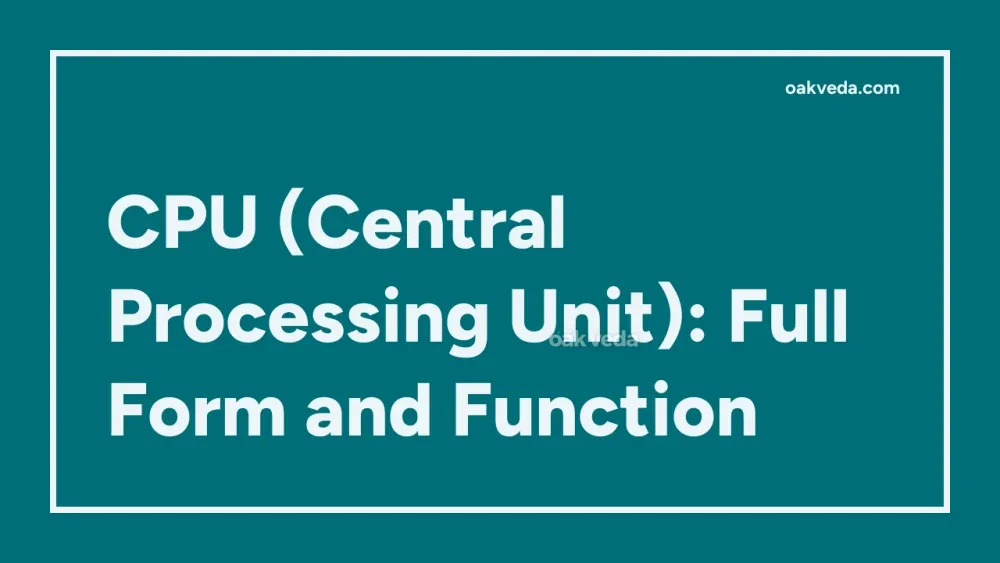
What is the Full Form of CPU?
The full form of CPU is Central Processing Unit. Often referred to as the "brain" of a computer, the CPU is a critical hardware component responsible for executing instructions and performing calculations that drive all computing operations.
What is Central Processing Unit?
The Central Processing Unit (CPU) is the primary component of a computer that interprets and executes most of the commands from the computer's other hardware and software. It performs all the basic logical and arithmetic operations, coordinates activities, and manages data flow within the computer system.
Origin and Development of Central Processing Unit
The concept of a central processing unit dates back to the early days of computing. However, the term "CPU" gained prominence in the 1960s with the rise of mainframe computers. The development of CPUs has been marked by significant milestones:
- Vacuum Tubes: Early computers used vacuum tubes for processing.
- Transistors: Introduced in the 1950s, leading to smaller and more efficient CPUs.
- Integrated Circuits: Developed in the 1960s, allowing for more complex CPU designs.
- Microprocessors: The first commercial microprocessor, the Intel 4004, was released in 1971.
- Multi-core Processors: Introduced in the early 2000s to improve performance and efficiency.
How does Central Processing Unit work?
The CPU operates by fetching, decoding, and executing instructions in a continuous cycle known as the fetch-decode-execute cycle. This process involves three main components:
- Arithmetic Logic Unit (ALU): Performs mathematical and logical operations.
- Control Unit (CU): Manages and coordinates CPU operations.
- Registers: High-speed memory locations for temporary data storage during processing.
The basic formula for CPU operation can be expressed as:
CPU = ALU + CU
Types of Central Processing Unit
Modern CPUs come in various types, each designed for specific computing needs:
- Single-core CPUs: Contain one processing unit.
- Multi-core CPUs: Feature multiple processing units on a single chip.
- Server CPUs: Designed for high-performance computing in data centers.
- Mobile CPUs: Optimized for power efficiency in smartphones and tablets.
- Desktop CPUs: Balanced for performance and power consumption in personal computers.
Functions of Central Processing Unit
The CPU performs several crucial functions in a computer system:
- Fetch Instructions: Retrieves program instructions from memory.
- Decode Instructions: Interprets the fetched instructions.
- Execute Instructions: Carries out the decoded instructions.
- Perform Calculations: Conducts arithmetic and logical operations.
- Manage Data Flow: Controls data movement between CPU and other components.
- Coordinate System Activities: Oversees the operation of other hardware components.
Applications of Central Processing Unit
CPUs are ubiquitous in modern technology, finding applications in:
- Personal Computers
- Smartphones and Tablets
- Servers and Data Centers
- Embedded Systems
- Internet of Things (IoT) Devices
- Gaming Consoles
- Automotive Computing Systems
Features of Central Processing Unit
Modern CPUs boast several advanced features:
- Clock Speed: Measured in GHz, determines how many instructions can be processed per second.
- Cache Memory: High-speed memory for quick data access.
- Multithreading: Ability to handle multiple threads of execution simultaneously.
- Virtualization Support: Enables running multiple operating systems on a single machine.
- Integrated Graphics: Some CPUs include built-in graphics processing capabilities.
Benefits of Central Processing Unit
The CPU provides numerous benefits to computing systems:
- Fast Processing: Enables quick execution of complex tasks.
- Multitasking: Allows running multiple applications simultaneously.
- System Control: Manages overall computer operations.
- Energy Efficiency: Modern CPUs are designed for optimal power consumption.
- Versatility: Supports a wide range of computing applications.
Limitations or Challenges of Central Processing Unit
Despite their capabilities, CPUs face certain limitations:
- Heat Generation: High-performance CPUs can produce significant heat.
- Power Consumption: Increased performance often leads to higher energy use.
- Physical Size Limitations: Miniaturization challenges in mobile devices.
- Quantum Limits: Approaching physical limits of transistor size reduction.
Future Developments in Central Processing Unit Technology
The future of CPU technology looks promising with several emerging trends:
- Quantum Computing: Exploring quantum mechanics for exponential performance increases.
- Neuromorphic Computing: Developing brain-inspired architectures for improved efficiency.
- 3D Chip Stacking: Enhancing performance through vertical integration of components.
- Advanced Materials: Investigating new materials like graphene for improved conductivity.
FAQs on CPU Full Form
-
What is the primary function of a CPU? The primary function of a CPU is to execute instructions, perform calculations, and manage data flow within a computer system.
-
How does CPU speed affect computer performance? Higher CPU speeds generally result in faster processing and improved overall system performance.
-
Can a computer work without a CPU? No, a computer cannot function without a CPU as it is the primary component responsible for processing instructions and managing system operations.
-
What's the difference between CPU and GPU? While CPUs are designed for general-purpose computing, GPUs (Graphics Processing Units) are specialized for rendering graphics and parallel processing tasks.
-
How often should I upgrade my CPU? The need for a CPU upgrade depends on your computing requirements. For general users, a CPU can last 3-5 years, while power users might upgrade more frequently.
You may be interested in:

